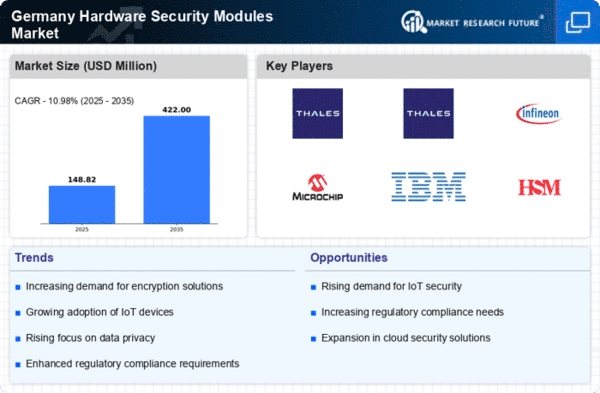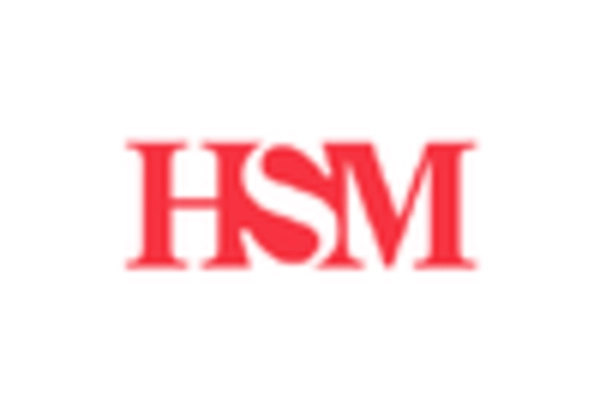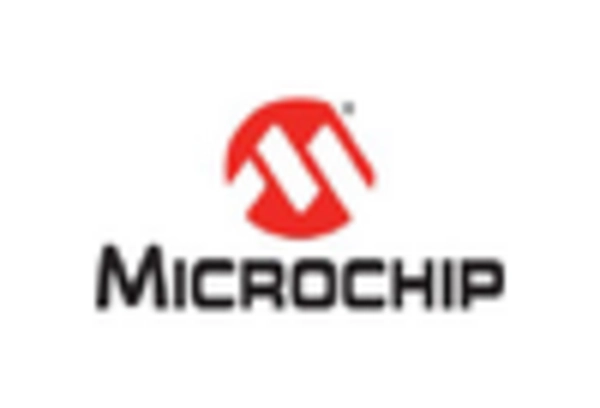Growing Adoption of IoT Devices
The proliferation of Internet of Things (IoT) devices in Germany is driving the hardware security-modules market. As more devices become interconnected, the potential for security vulnerabilities increases. Organizations are recognizing the need for robust security solutions to protect these devices and the data they generate. The hardware security-modules market is likely to benefit from this trend, as businesses seek to secure their IoT ecosystems. In 2025, it is projected that the number of IoT devices in Germany will exceed 1 billion, creating a substantial demand for security solutions. This growth presents an opportunity for hardware security modules to play a pivotal role in safeguarding IoT networks and ensuring data integrity.
Increasing Cybersecurity Threats
The Hardware Security Modules Market is experiencing growth due to the escalating threats posed by cybercriminals. In Germany, the frequency of cyberattacks has surged, prompting organizations to invest in robust security solutions. The market is projected to expand as businesses recognize the necessity of safeguarding sensitive data. According to recent reports, the cybersecurity sector in Germany is expected to grow at a CAGR of 10.5% through 2027. This trend indicates a heightened awareness of the importance of hardware security modules in protecting against data breaches and ensuring compliance with stringent regulations. As organizations strive to enhance their security posture, the demand for hardware security modules is likely to increase, driving market growth in the coming years.
Rising Awareness of Data Breaches
The hardware security-modules market is being propelled by the increasing awareness of data breaches among organizations in Germany. High-profile incidents have highlighted the vulnerabilities in data protection, prompting businesses to reassess their security strategies. As a result, there is a growing recognition of the importance of hardware security modules in mitigating risks associated with data breaches. In 2025, it is estimated that the cost of data breaches in Germany will reach €5 billion, further emphasizing the need for effective security solutions. This awareness is likely to drive investments in hardware security modules, as organizations seek to enhance their defenses against potential threats and protect sensitive information.
Regulatory Compliance Requirements
The hardware security-modules market is significantly influenced by the stringent regulatory landscape in Germany. Organizations are mandated to comply with various data protection laws, such as the General Data Protection Regulation (GDPR). These regulations necessitate the implementation of advanced security measures to protect personal data. As a result, businesses are increasingly adopting hardware security modules to ensure compliance and avoid hefty fines. The market is expected to witness a surge in demand as companies prioritize regulatory adherence. In 2025, it is estimated that compliance-related investments in cybersecurity will account for approximately 30% of total IT budgets in Germany. This trend underscores the critical role of hardware security modules in meeting regulatory requirements and enhancing overall data security.
Technological Innovations in Security Solutions
The hardware security-modules market is benefiting from ongoing technological innovations in security solutions. In Germany, advancements in cryptography and secure key management are enhancing the capabilities of hardware security modules. These innovations are making it easier for organizations to implement robust security measures and protect sensitive data. As technology evolves, the demand for more sophisticated security solutions is likely to increase. In 2025, it is anticipated that the market for advanced security technologies will grow by 15%, indicating a strong interest in hardware security modules. This trend suggests that organizations are increasingly looking for cutting-edge solutions to address emerging security challenges.
















